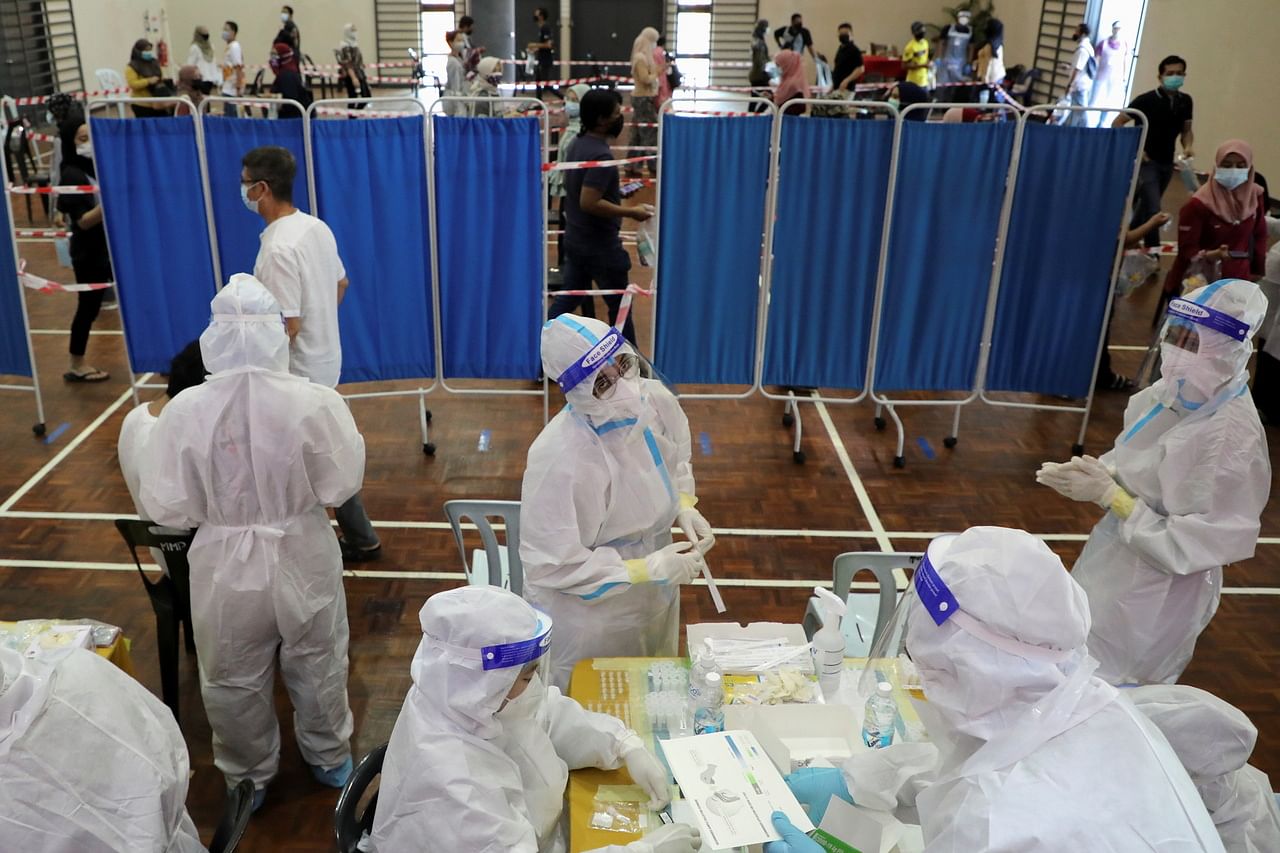KUALA LUMPUR - The heads of Malaysia's nine royal households are set to hold an emergency meeting next Wednesday (June 16), to discuss the country's Covid-19 crisis, according to senior political and royal household sources.
The sources said this session will be preceded by separate private discussions this week between the King, Sultan Abdullah Ahmad Shah, and leaders of registered political parties to get feedback on the government's handling of the pandemic.
Royal household sources told The Straits Times that the rulers' meeting next Wednesday, which will be held after lunch at the national palace in the capital Kuala Lumpur, was decided a few days ago, owing to the worsening Covid-19 health crisis, stumbles in the vaccine roll-out campaign, and growing calls to end the state of emergency and allow Parliament to convene.
"This is not a Conference of Rulers session but a special emergency meeting," said a source close to one royal household. He declined to elaborate.
A scheduled Conference of Rulers meeting on Feb 24 was cancelled at the last minute owing to the restrictions under a movement control order that was in force at the time. The conference among the sultans, which is held three times a year, is now set for June 30.
Official sources at the national palace could not be reached immediately to comment on the matter as Monday was a public holiday to mark the birthday of the King.
Online news portals reported on Monday that Sultan Abdullah will be meeting political party leaders starting this Wednesday. The Malaysian Insight quoted a government source saying that the meeting will be "restricted to registered parties only".
Senior political sources from Parti Keadilan Rakyat (PKR), headed by opposition leader Anwar Ibrahim, acknowledged that "there have been engagements with the palace" in recent days but declined to confirm whether a meeting with the King had been scheduled for this week.
"Things are very fluid and best to wait until Wednesday (June 9)," one senior aide to Datuk Seri Anwar said over a brief telephone conversation.
The flurry of political activity in the coming days could have serious implications for Prime Minister Muhyiddin Yassin's embattled government.
Malaysia's royal households have been forced in recent months to assume the unlikely role as adjudicator in the country's messy politics.
It was Sultan Abdullah who intervened directly last year to break the country's political impasse by appointing Tan Sri Muhyiddin as premier following the collapse of the Pakatan Harapan coalition.
Sultan Abdullah also made the decision in January to approve the government's request to declare a state of emergency, which will end on Aug 1, to deal with the pandemic.
Malaysia is currently under a strict two-week lockdown that will end on June 14.
While infection numbers are showing a downward trend, the number of daily infections remains high, with total cases breaching 600,000 in recent days. Deaths have also been spiking, with more than 3,000 people succumbing to the virus since the pandemic began last year.
The health crisis has turned public sentiment against the Muhyiddin administration, which is being accused of using the state of emergency to cling to power and avoid any sitting of Parliament that will challenge its legitimacy and the government's handling of the pandemic.
Large sections of young Malaysians, particularly youth from the country's dominant ethnic Malay majority, have stepped up to call out the government amid growing economic hardship and uncertainty over their future.
Malaysia's Twittersphere has been dominated in recent weeks by protests under the hashtag #kerajaangagal (failed government), together with #Muhyiddinout.
But close allies of Mr Muhyiddin insist that the state of emergency is crucial for the handling of the crisis. They also noted that an extension of the state of emergency is being considered as an option, should current efforts to deal with the pandemic fail to produce the required results.
"The government never expected things to get this bad and it is an option on the table," said a senior politician from Mr Muhyiddin's Parti Pribumi Bersatu Malaysia, who asked not to be identified because of the sensitive nature of the matter.
But he admitted that "how the public will react is a worry", should the government extend the state of emergency beyond its Aug 1 deadline.
Any proclamation of an extension to the emergency can be given only by the King and his brother rulers.

Mr Muhyiddin had originally asked Sultan Abdullah to declare a state of emergency in late October. But that application was rejected after the King and his brother sultans deliberated over the matter in a special session.
The current emergency was granted by Sultan Abdullah on Jan 12 without any known meeting among the sultans.
Opposition politicians are against any extension to the state of emergency.
"The emergency was declared and the Parliament was suspended in order to cling to power," Mr Anwar told ST, adding that the government's handling of the pandemic has been a "dismal failure" judging from the roughly 2,000 daily cases that the country was registering before the state of emergency was declared early this year.
Mr Anwar and other opposition politicians blame the worsening situation on several factors, such as the government's inconsistent approach in dealing with the pandemic, stumbles in the vaccine roll-out campaign and poor enforcement of movement control measures to limit the spread of infections.












